Entrepreneurship Report: Small Business Impact and Strategies
VerifiedAdded on 2020/07/23
|20
|6256
|91
Report
AI Summary
This report delves into the realm of entrepreneurship, exploring various venture types, including social enterprises, family-run businesses, franchise businesses, and small business ventures. It examines the similarities and differences between these ventures, analyzing their structures and operational characteristics. The report further investigates the impact of small businesses on the UK economy, providing data and statistics on their contribution. It also discusses the role of small and business start-ups in the growth of the social economy, particularly in the context of Brexit. The report then focuses on the traits and skills of successful entrepreneurs, differentiating them from traditional business managers, and analyzing the impact of past experience and personal background on entrepreneurial motivation and mindset. The analysis includes discussion on the UK government's classification of businesses and the structure of sole proprietorships, partnerships, and private companies. This report provides a comprehensive overview of the entrepreneurial landscape and the factors that contribute to business success.

Entrepreneurship
Paraphrase This Document
Need a fresh take? Get an instant paraphrase of this document with our AI Paraphraser
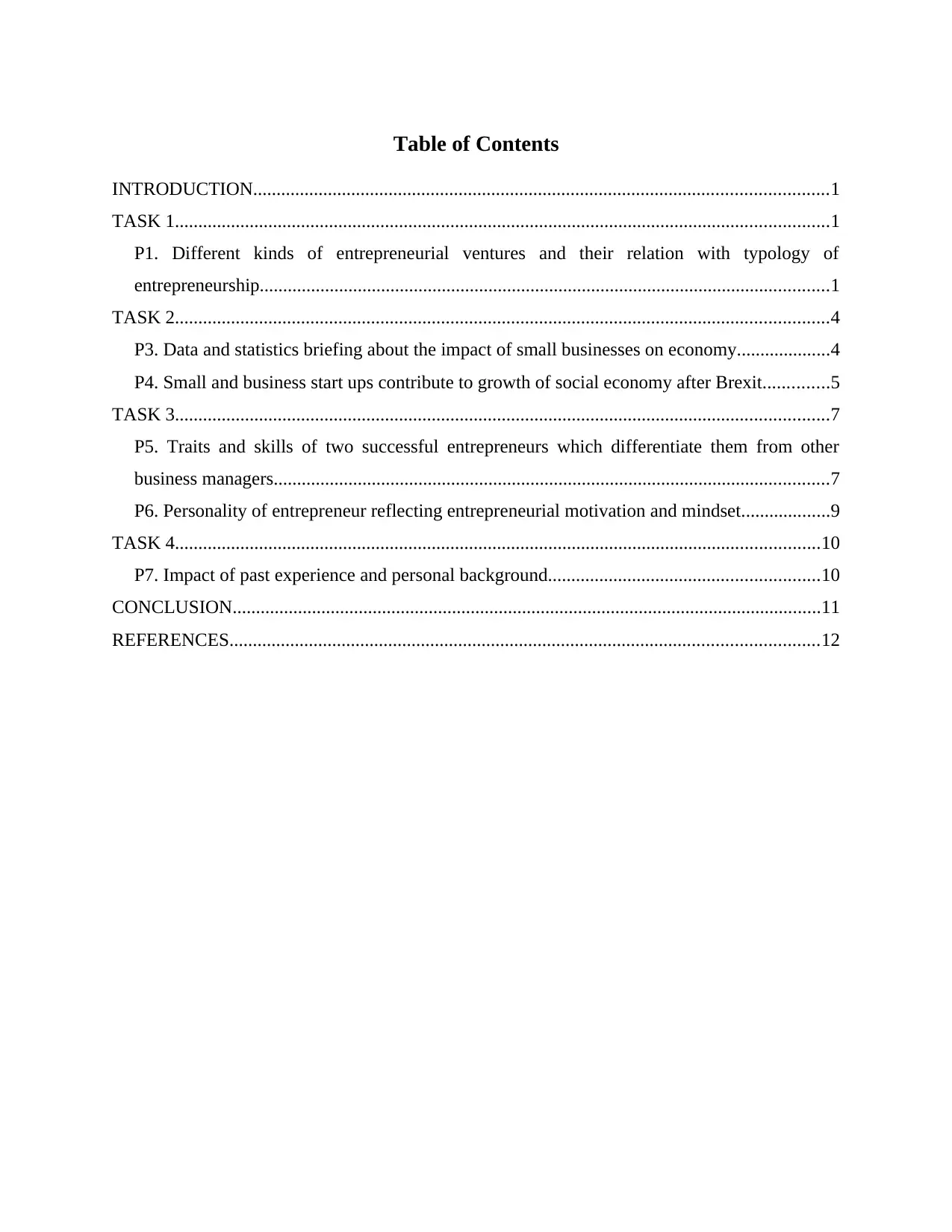
Table of Contents
INTRODUCTION...........................................................................................................................1
TASK 1............................................................................................................................................1
P1. Different kinds of entrepreneurial ventures and their relation with typology of
entrepreneurship..........................................................................................................................1
TASK 2............................................................................................................................................4
P3. Data and statistics briefing about the impact of small businesses on economy....................4
P4. Small and business start ups contribute to growth of social economy after Brexit..............5
TASK 3............................................................................................................................................7
P5. Traits and skills of two successful entrepreneurs which differentiate them from other
business managers.......................................................................................................................7
P6. Personality of entrepreneur reflecting entrepreneurial motivation and mindset...................9
TASK 4..........................................................................................................................................10
P7. Impact of past experience and personal background..........................................................10
CONCLUSION..............................................................................................................................11
REFERENCES..............................................................................................................................12
INTRODUCTION...........................................................................................................................1
TASK 1............................................................................................................................................1
P1. Different kinds of entrepreneurial ventures and their relation with typology of
entrepreneurship..........................................................................................................................1
TASK 2............................................................................................................................................4
P3. Data and statistics briefing about the impact of small businesses on economy....................4
P4. Small and business start ups contribute to growth of social economy after Brexit..............5
TASK 3............................................................................................................................................7
P5. Traits and skills of two successful entrepreneurs which differentiate them from other
business managers.......................................................................................................................7
P6. Personality of entrepreneur reflecting entrepreneurial motivation and mindset...................9
TASK 4..........................................................................................................................................10
P7. Impact of past experience and personal background..........................................................10
CONCLUSION..............................................................................................................................11
REFERENCES..............................................................................................................................12

⊘ This is a preview!⊘
Do you want full access?
Subscribe today to unlock all pages.

Trusted by 1+ million students worldwide
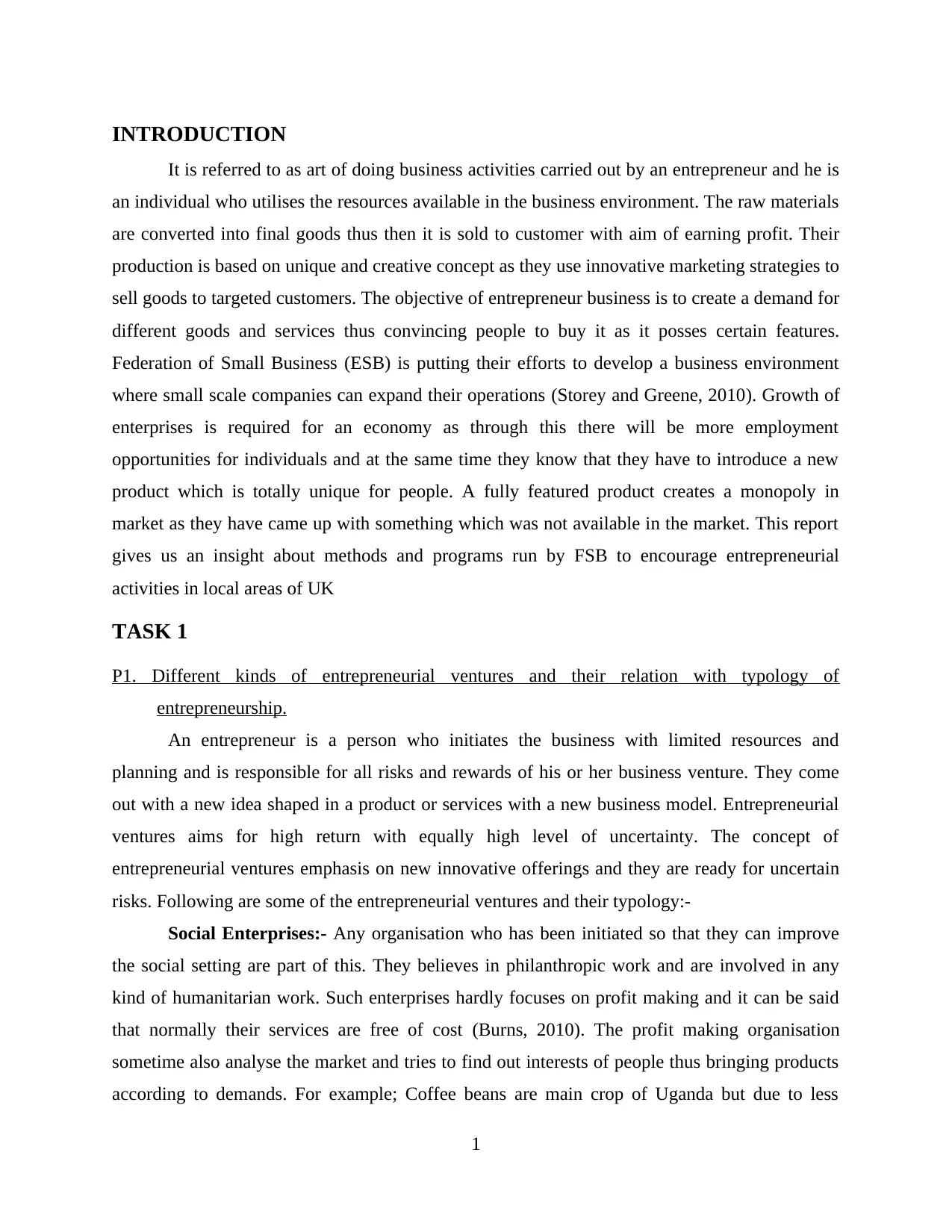
INTRODUCTION
It is referred to as art of doing business activities carried out by an entrepreneur and he is
an individual who utilises the resources available in the business environment. The raw materials
are converted into final goods thus then it is sold to customer with aim of earning profit. Their
production is based on unique and creative concept as they use innovative marketing strategies to
sell goods to targeted customers. The objective of entrepreneur business is to create a demand for
different goods and services thus convincing people to buy it as it posses certain features.
Federation of Small Business (ESB) is putting their efforts to develop a business environment
where small scale companies can expand their operations (Storey and Greene, 2010). Growth of
enterprises is required for an economy as through this there will be more employment
opportunities for individuals and at the same time they know that they have to introduce a new
product which is totally unique for people. A fully featured product creates a monopoly in
market as they have came up with something which was not available in the market. This report
gives us an insight about methods and programs run by FSB to encourage entrepreneurial
activities in local areas of UK
TASK 1
P1. Different kinds of entrepreneurial ventures and their relation with typology of
entrepreneurship.
An entrepreneur is a person who initiates the business with limited resources and
planning and is responsible for all risks and rewards of his or her business venture. They come
out with a new idea shaped in a product or services with a new business model. Entrepreneurial
ventures aims for high return with equally high level of uncertainty. The concept of
entrepreneurial ventures emphasis on new innovative offerings and they are ready for uncertain
risks. Following are some of the entrepreneurial ventures and their typology:-
Social Enterprises:- Any organisation who has been initiated so that they can improve
the social setting are part of this. They believes in philanthropic work and are involved in any
kind of humanitarian work. Such enterprises hardly focuses on profit making and it can be said
that normally their services are free of cost (Burns, 2010). The profit making organisation
sometime also analyse the market and tries to find out interests of people thus bringing products
according to demands. For example; Coffee beans are main crop of Uganda but due to less
1
It is referred to as art of doing business activities carried out by an entrepreneur and he is
an individual who utilises the resources available in the business environment. The raw materials
are converted into final goods thus then it is sold to customer with aim of earning profit. Their
production is based on unique and creative concept as they use innovative marketing strategies to
sell goods to targeted customers. The objective of entrepreneur business is to create a demand for
different goods and services thus convincing people to buy it as it posses certain features.
Federation of Small Business (ESB) is putting their efforts to develop a business environment
where small scale companies can expand their operations (Storey and Greene, 2010). Growth of
enterprises is required for an economy as through this there will be more employment
opportunities for individuals and at the same time they know that they have to introduce a new
product which is totally unique for people. A fully featured product creates a monopoly in
market as they have came up with something which was not available in the market. This report
gives us an insight about methods and programs run by FSB to encourage entrepreneurial
activities in local areas of UK
TASK 1
P1. Different kinds of entrepreneurial ventures and their relation with typology of
entrepreneurship.
An entrepreneur is a person who initiates the business with limited resources and
planning and is responsible for all risks and rewards of his or her business venture. They come
out with a new idea shaped in a product or services with a new business model. Entrepreneurial
ventures aims for high return with equally high level of uncertainty. The concept of
entrepreneurial ventures emphasis on new innovative offerings and they are ready for uncertain
risks. Following are some of the entrepreneurial ventures and their typology:-
Social Enterprises:- Any organisation who has been initiated so that they can improve
the social setting are part of this. They believes in philanthropic work and are involved in any
kind of humanitarian work. Such enterprises hardly focuses on profit making and it can be said
that normally their services are free of cost (Burns, 2010). The profit making organisation
sometime also analyse the market and tries to find out interests of people thus bringing products
according to demands. For example; Coffee beans are main crop of Uganda but due to less
1
Paraphrase This Document
Need a fresh take? Get an instant paraphrase of this document with our AI Paraphraser
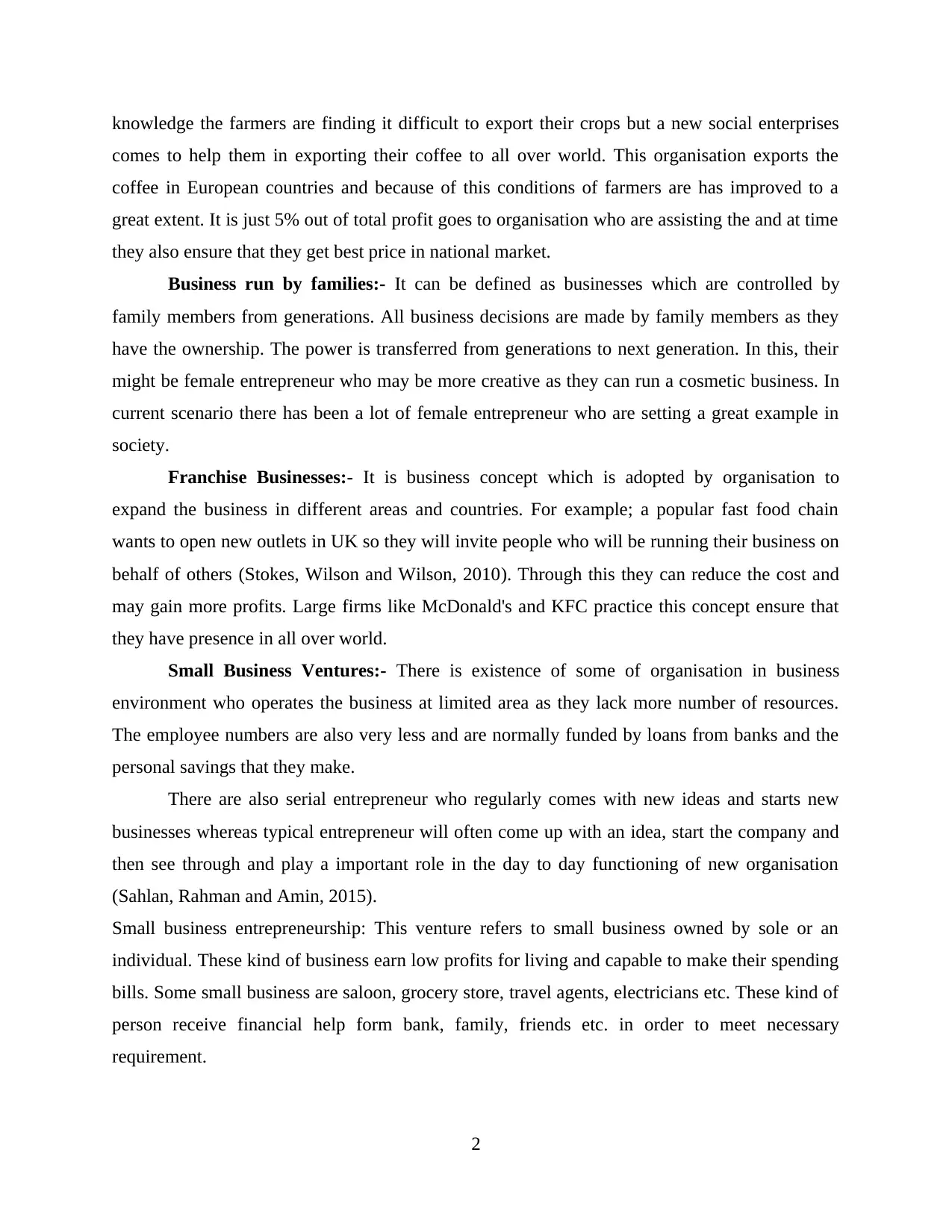
knowledge the farmers are finding it difficult to export their crops but a new social enterprises
comes to help them in exporting their coffee to all over world. This organisation exports the
coffee in European countries and because of this conditions of farmers are has improved to a
great extent. It is just 5% out of total profit goes to organisation who are assisting the and at time
they also ensure that they get best price in national market.
Business run by families:- It can be defined as businesses which are controlled by
family members from generations. All business decisions are made by family members as they
have the ownership. The power is transferred from generations to next generation. In this, their
might be female entrepreneur who may be more creative as they can run a cosmetic business. In
current scenario there has been a lot of female entrepreneur who are setting a great example in
society.
Franchise Businesses:- It is business concept which is adopted by organisation to
expand the business in different areas and countries. For example; a popular fast food chain
wants to open new outlets in UK so they will invite people who will be running their business on
behalf of others (Stokes, Wilson and Wilson, 2010). Through this they can reduce the cost and
may gain more profits. Large firms like McDonald's and KFC practice this concept ensure that
they have presence in all over world.
Small Business Ventures:- There is existence of some of organisation in business
environment who operates the business at limited area as they lack more number of resources.
The employee numbers are also very less and are normally funded by loans from banks and the
personal savings that they make.
There are also serial entrepreneur who regularly comes with new ideas and starts new
businesses whereas typical entrepreneur will often come up with an idea, start the company and
then see through and play a important role in the day to day functioning of new organisation
(Sahlan, Rahman and Amin, 2015).
Small business entrepreneurship: This venture refers to small business owned by sole or an
individual. These kind of business earn low profits for living and capable to make their spending
bills. Some small business are saloon, grocery store, travel agents, electricians etc. These kind of
person receive financial help form bank, family, friends etc. in order to meet necessary
requirement.
2
comes to help them in exporting their coffee to all over world. This organisation exports the
coffee in European countries and because of this conditions of farmers are has improved to a
great extent. It is just 5% out of total profit goes to organisation who are assisting the and at time
they also ensure that they get best price in national market.
Business run by families:- It can be defined as businesses which are controlled by
family members from generations. All business decisions are made by family members as they
have the ownership. The power is transferred from generations to next generation. In this, their
might be female entrepreneur who may be more creative as they can run a cosmetic business. In
current scenario there has been a lot of female entrepreneur who are setting a great example in
society.
Franchise Businesses:- It is business concept which is adopted by organisation to
expand the business in different areas and countries. For example; a popular fast food chain
wants to open new outlets in UK so they will invite people who will be running their business on
behalf of others (Stokes, Wilson and Wilson, 2010). Through this they can reduce the cost and
may gain more profits. Large firms like McDonald's and KFC practice this concept ensure that
they have presence in all over world.
Small Business Ventures:- There is existence of some of organisation in business
environment who operates the business at limited area as they lack more number of resources.
The employee numbers are also very less and are normally funded by loans from banks and the
personal savings that they make.
There are also serial entrepreneur who regularly comes with new ideas and starts new
businesses whereas typical entrepreneur will often come up with an idea, start the company and
then see through and play a important role in the day to day functioning of new organisation
(Sahlan, Rahman and Amin, 2015).
Small business entrepreneurship: This venture refers to small business owned by sole or an
individual. These kind of business earn low profits for living and capable to make their spending
bills. Some small business are saloon, grocery store, travel agents, electricians etc. These kind of
person receive financial help form bank, family, friends etc. in order to meet necessary
requirement.
2
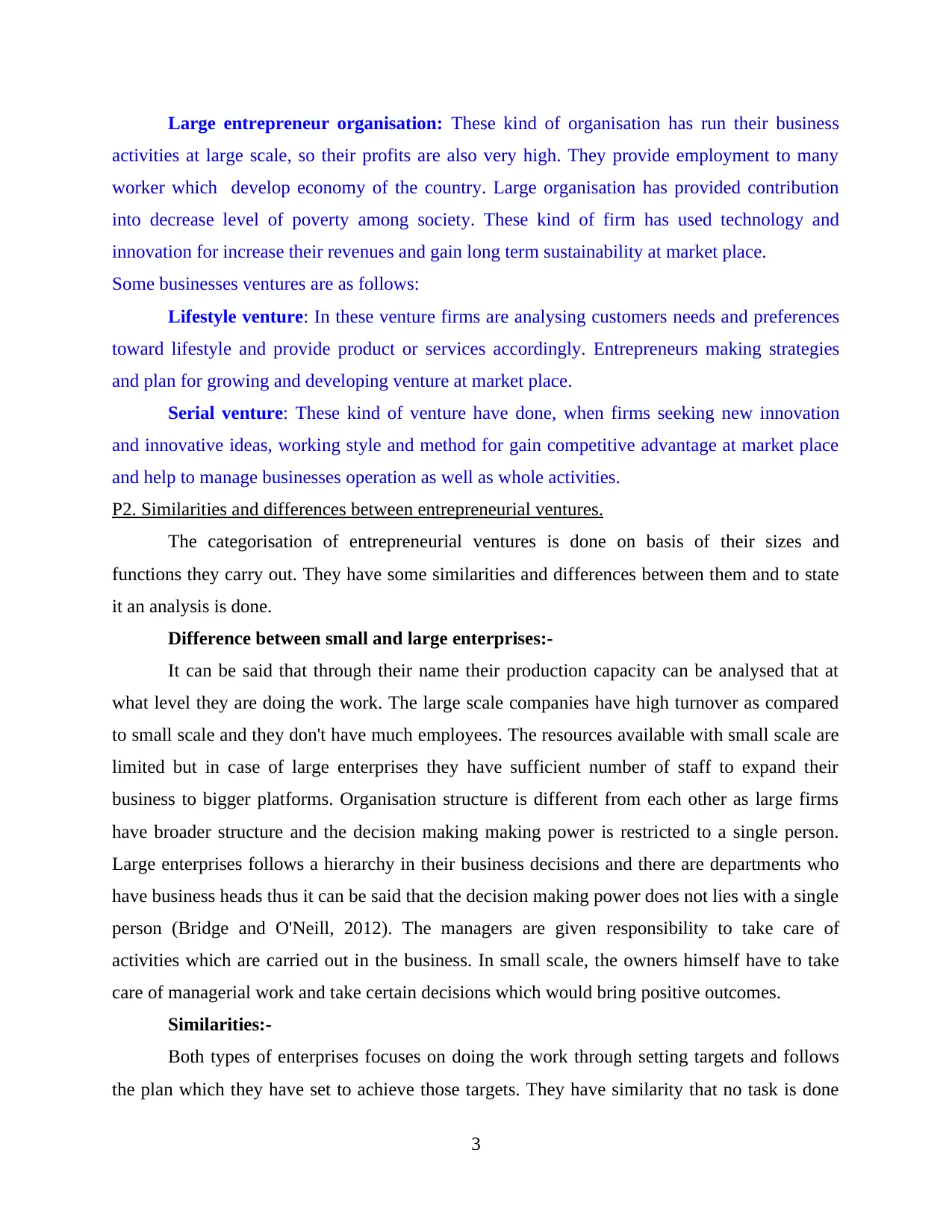
Large entrepreneur organisation: These kind of organisation has run their business
activities at large scale, so their profits are also very high. They provide employment to many
worker which develop economy of the country. Large organisation has provided contribution
into decrease level of poverty among society. These kind of firm has used technology and
innovation for increase their revenues and gain long term sustainability at market place.
Some businesses ventures are as follows:
Lifestyle venture: In these venture firms are analysing customers needs and preferences
toward lifestyle and provide product or services accordingly. Entrepreneurs making strategies
and plan for growing and developing venture at market place.
Serial venture: These kind of venture have done, when firms seeking new innovation
and innovative ideas, working style and method for gain competitive advantage at market place
and help to manage businesses operation as well as whole activities.
P2. Similarities and differences between entrepreneurial ventures.
The categorisation of entrepreneurial ventures is done on basis of their sizes and
functions they carry out. They have some similarities and differences between them and to state
it an analysis is done.
Difference between small and large enterprises:-
It can be said that through their name their production capacity can be analysed that at
what level they are doing the work. The large scale companies have high turnover as compared
to small scale and they don't have much employees. The resources available with small scale are
limited but in case of large enterprises they have sufficient number of staff to expand their
business to bigger platforms. Organisation structure is different from each other as large firms
have broader structure and the decision making making power is restricted to a single person.
Large enterprises follows a hierarchy in their business decisions and there are departments who
have business heads thus it can be said that the decision making power does not lies with a single
person (Bridge and O'Neill, 2012). The managers are given responsibility to take care of
activities which are carried out in the business. In small scale, the owners himself have to take
care of managerial work and take certain decisions which would bring positive outcomes.
Similarities:-
Both types of enterprises focuses on doing the work through setting targets and follows
the plan which they have set to achieve those targets. They have similarity that no task is done
3
activities at large scale, so their profits are also very high. They provide employment to many
worker which develop economy of the country. Large organisation has provided contribution
into decrease level of poverty among society. These kind of firm has used technology and
innovation for increase their revenues and gain long term sustainability at market place.
Some businesses ventures are as follows:
Lifestyle venture: In these venture firms are analysing customers needs and preferences
toward lifestyle and provide product or services accordingly. Entrepreneurs making strategies
and plan for growing and developing venture at market place.
Serial venture: These kind of venture have done, when firms seeking new innovation
and innovative ideas, working style and method for gain competitive advantage at market place
and help to manage businesses operation as well as whole activities.
P2. Similarities and differences between entrepreneurial ventures.
The categorisation of entrepreneurial ventures is done on basis of their sizes and
functions they carry out. They have some similarities and differences between them and to state
it an analysis is done.
Difference between small and large enterprises:-
It can be said that through their name their production capacity can be analysed that at
what level they are doing the work. The large scale companies have high turnover as compared
to small scale and they don't have much employees. The resources available with small scale are
limited but in case of large enterprises they have sufficient number of staff to expand their
business to bigger platforms. Organisation structure is different from each other as large firms
have broader structure and the decision making making power is restricted to a single person.
Large enterprises follows a hierarchy in their business decisions and there are departments who
have business heads thus it can be said that the decision making power does not lies with a single
person (Bridge and O'Neill, 2012). The managers are given responsibility to take care of
activities which are carried out in the business. In small scale, the owners himself have to take
care of managerial work and take certain decisions which would bring positive outcomes.
Similarities:-
Both types of enterprises focuses on doing the work through setting targets and follows
the plan which they have set to achieve those targets. They have similarity that no task is done
3
⊘ This is a preview!⊘
Do you want full access?
Subscribe today to unlock all pages.

Trusted by 1+ million students worldwide
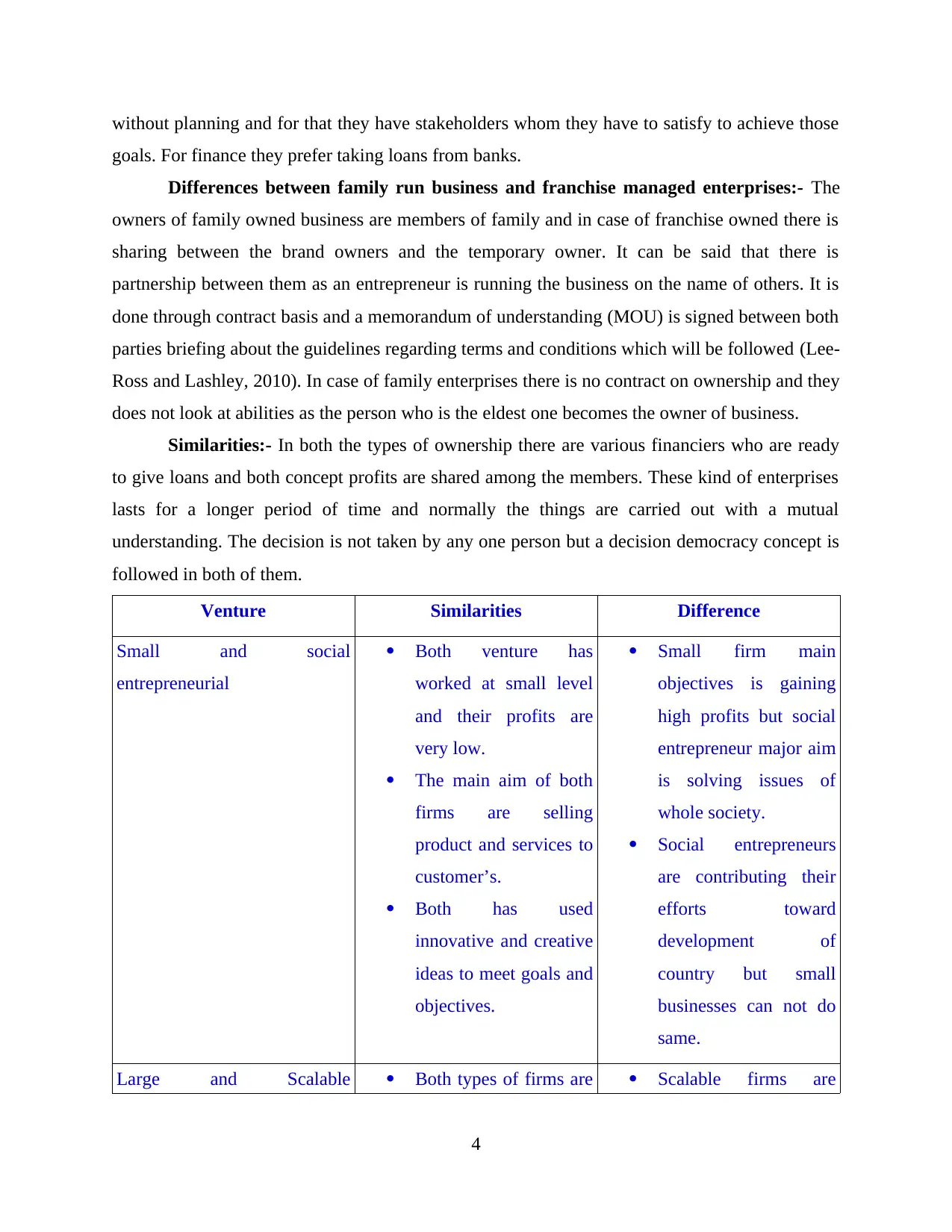
without planning and for that they have stakeholders whom they have to satisfy to achieve those
goals. For finance they prefer taking loans from banks.
Differences between family run business and franchise managed enterprises:- The
owners of family owned business are members of family and in case of franchise owned there is
sharing between the brand owners and the temporary owner. It can be said that there is
partnership between them as an entrepreneur is running the business on the name of others. It is
done through contract basis and a memorandum of understanding (MOU) is signed between both
parties briefing about the guidelines regarding terms and conditions which will be followed (Lee-
Ross and Lashley, 2010). In case of family enterprises there is no contract on ownership and they
does not look at abilities as the person who is the eldest one becomes the owner of business.
Similarities:- In both the types of ownership there are various financiers who are ready
to give loans and both concept profits are shared among the members. These kind of enterprises
lasts for a longer period of time and normally the things are carried out with a mutual
understanding. The decision is not taken by any one person but a decision democracy concept is
followed in both of them.
Venture Similarities Difference
Small and social
entrepreneurial
Both venture has
worked at small level
and their profits are
very low.
The main aim of both
firms are selling
product and services to
customer’s.
Both has used
innovative and creative
ideas to meet goals and
objectives.
Small firm main
objectives is gaining
high profits but social
entrepreneur major aim
is solving issues of
whole society.
Social entrepreneurs
are contributing their
efforts toward
development of
country but small
businesses can not do
same.
Large and Scalable Both types of firms are Scalable firms are
4
goals. For finance they prefer taking loans from banks.
Differences between family run business and franchise managed enterprises:- The
owners of family owned business are members of family and in case of franchise owned there is
sharing between the brand owners and the temporary owner. It can be said that there is
partnership between them as an entrepreneur is running the business on the name of others. It is
done through contract basis and a memorandum of understanding (MOU) is signed between both
parties briefing about the guidelines regarding terms and conditions which will be followed (Lee-
Ross and Lashley, 2010). In case of family enterprises there is no contract on ownership and they
does not look at abilities as the person who is the eldest one becomes the owner of business.
Similarities:- In both the types of ownership there are various financiers who are ready
to give loans and both concept profits are shared among the members. These kind of enterprises
lasts for a longer period of time and normally the things are carried out with a mutual
understanding. The decision is not taken by any one person but a decision democracy concept is
followed in both of them.
Venture Similarities Difference
Small and social
entrepreneurial
Both venture has
worked at small level
and their profits are
very low.
The main aim of both
firms are selling
product and services to
customer’s.
Both has used
innovative and creative
ideas to meet goals and
objectives.
Small firm main
objectives is gaining
high profits but social
entrepreneur major aim
is solving issues of
whole society.
Social entrepreneurs
are contributing their
efforts toward
development of
country but small
businesses can not do
same.
Large and Scalable Both types of firms are Scalable firms are
4
Paraphrase This Document
Need a fresh take? Get an instant paraphrase of this document with our AI Paraphraser
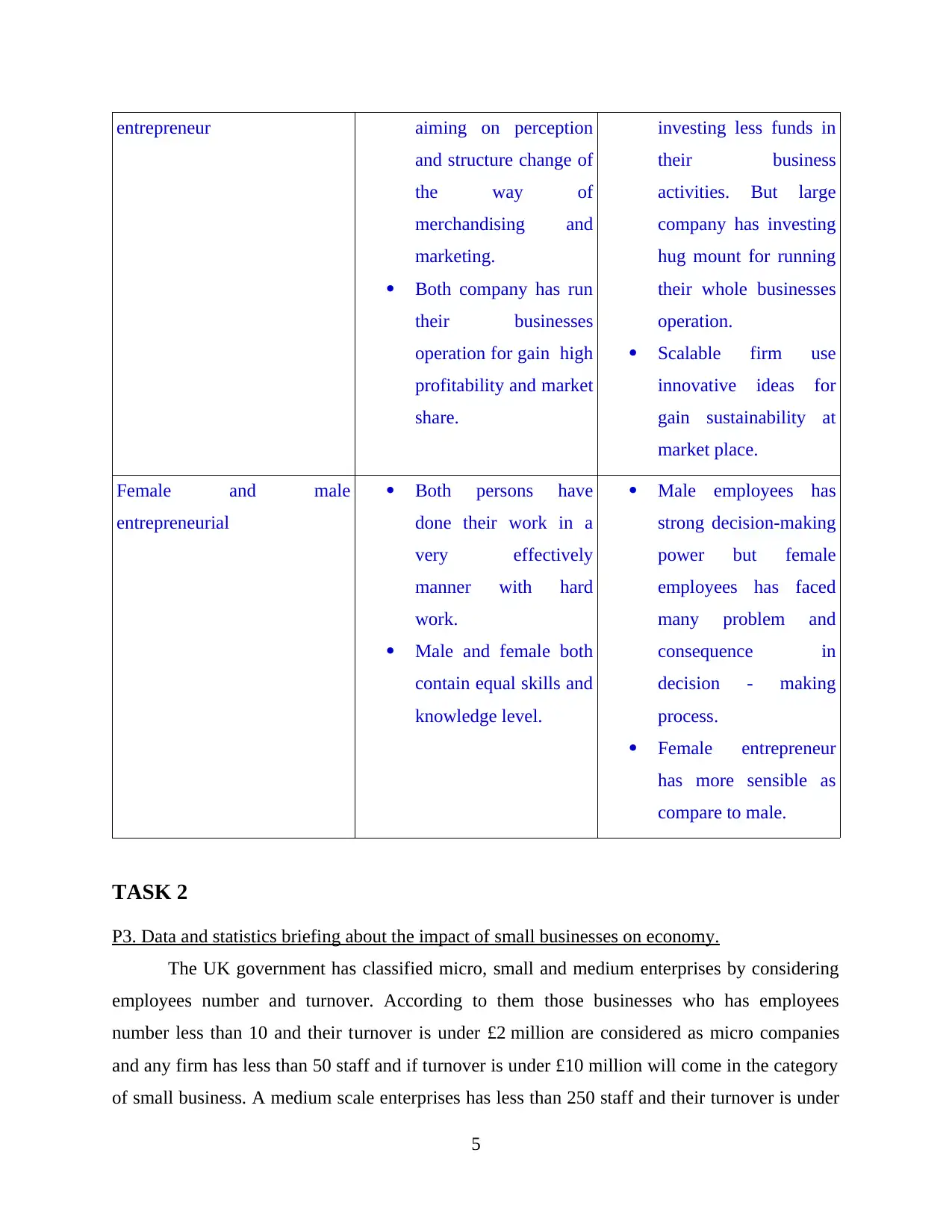
entrepreneur aiming on perception
and structure change of
the way of
merchandising and
marketing.
Both company has run
their businesses
operation for gain high
profitability and market
share.
investing less funds in
their business
activities. But large
company has investing
hug mount for running
their whole businesses
operation.
Scalable firm use
innovative ideas for
gain sustainability at
market place.
Female and male
entrepreneurial
Both persons have
done their work in a
very effectively
manner with hard
work.
Male and female both
contain equal skills and
knowledge level.
Male employees has
strong decision-making
power but female
employees has faced
many problem and
consequence in
decision - making
process.
Female entrepreneur
has more sensible as
compare to male.
TASK 2
P3. Data and statistics briefing about the impact of small businesses on economy.
The UK government has classified micro, small and medium enterprises by considering
employees number and turnover. According to them those businesses who has employees
number less than 10 and their turnover is under £2 million are considered as micro companies
and any firm has less than 50 staff and if turnover is under £10 million will come in the category
of small business. A medium scale enterprises has less than 250 staff and their turnover is under
5
and structure change of
the way of
merchandising and
marketing.
Both company has run
their businesses
operation for gain high
profitability and market
share.
investing less funds in
their business
activities. But large
company has investing
hug mount for running
their whole businesses
operation.
Scalable firm use
innovative ideas for
gain sustainability at
market place.
Female and male
entrepreneurial
Both persons have
done their work in a
very effectively
manner with hard
work.
Male and female both
contain equal skills and
knowledge level.
Male employees has
strong decision-making
power but female
employees has faced
many problem and
consequence in
decision - making
process.
Female entrepreneur
has more sensible as
compare to male.
TASK 2
P3. Data and statistics briefing about the impact of small businesses on economy.
The UK government has classified micro, small and medium enterprises by considering
employees number and turnover. According to them those businesses who has employees
number less than 10 and their turnover is under £2 million are considered as micro companies
and any firm has less than 50 staff and if turnover is under £10 million will come in the category
of small business. A medium scale enterprises has less than 250 staff and their turnover is under
5
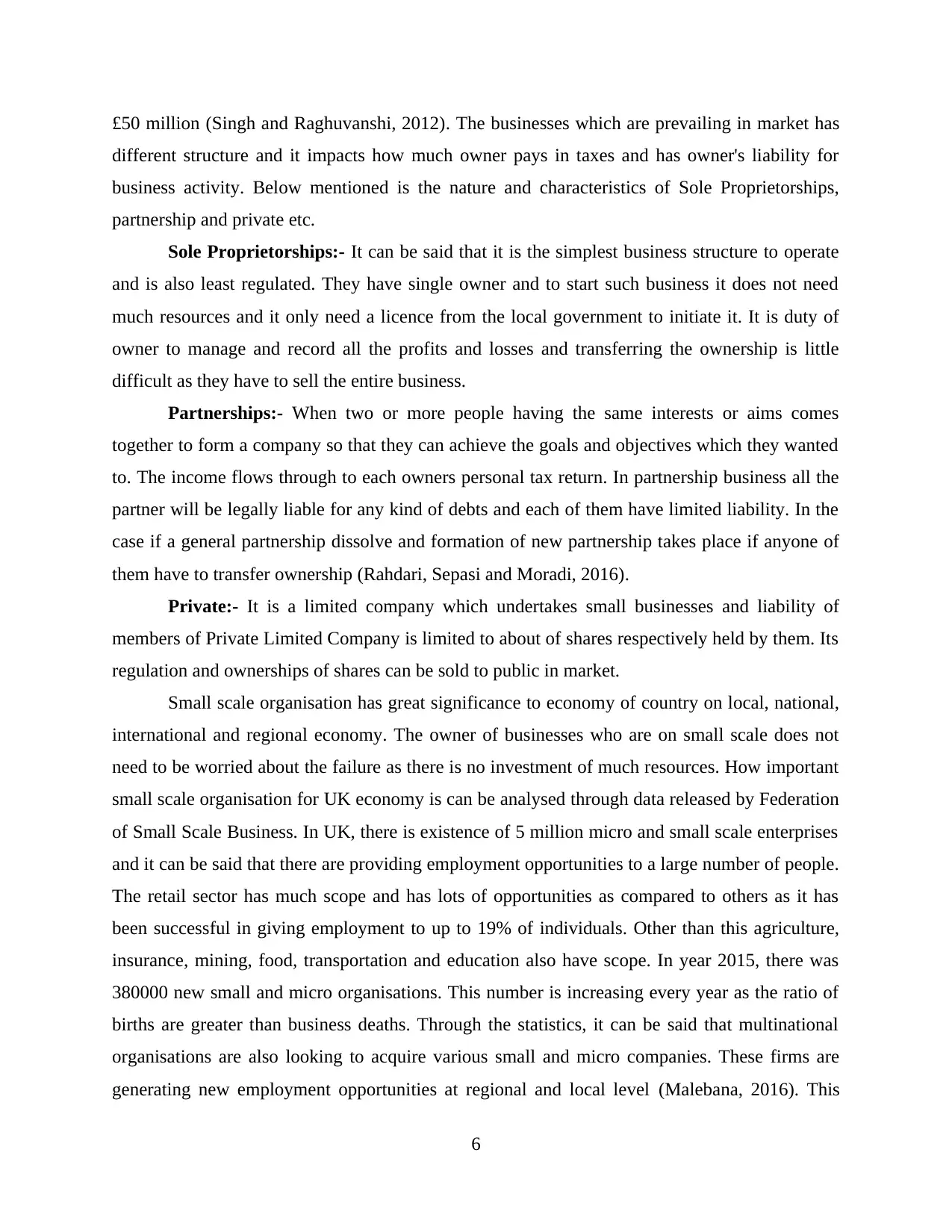
£50 million (Singh and Raghuvanshi, 2012). The businesses which are prevailing in market has
different structure and it impacts how much owner pays in taxes and has owner's liability for
business activity. Below mentioned is the nature and characteristics of Sole Proprietorships,
partnership and private etc.
Sole Proprietorships:- It can be said that it is the simplest business structure to operate
and is also least regulated. They have single owner and to start such business it does not need
much resources and it only need a licence from the local government to initiate it. It is duty of
owner to manage and record all the profits and losses and transferring the ownership is little
difficult as they have to sell the entire business.
Partnerships:- When two or more people having the same interests or aims comes
together to form a company so that they can achieve the goals and objectives which they wanted
to. The income flows through to each owners personal tax return. In partnership business all the
partner will be legally liable for any kind of debts and each of them have limited liability. In the
case if a general partnership dissolve and formation of new partnership takes place if anyone of
them have to transfer ownership (Rahdari, Sepasi and Moradi, 2016).
Private:- It is a limited company which undertakes small businesses and liability of
members of Private Limited Company is limited to about of shares respectively held by them. Its
regulation and ownerships of shares can be sold to public in market.
Small scale organisation has great significance to economy of country on local, national,
international and regional economy. The owner of businesses who are on small scale does not
need to be worried about the failure as there is no investment of much resources. How important
small scale organisation for UK economy is can be analysed through data released by Federation
of Small Scale Business. In UK, there is existence of 5 million micro and small scale enterprises
and it can be said that there are providing employment opportunities to a large number of people.
The retail sector has much scope and has lots of opportunities as compared to others as it has
been successful in giving employment to up to 19% of individuals. Other than this agriculture,
insurance, mining, food, transportation and education also have scope. In year 2015, there was
380000 new small and micro organisations. This number is increasing every year as the ratio of
births are greater than business deaths. Through the statistics, it can be said that multinational
organisations are also looking to acquire various small and micro companies. These firms are
generating new employment opportunities at regional and local level (Malebana, 2016). This
6
different structure and it impacts how much owner pays in taxes and has owner's liability for
business activity. Below mentioned is the nature and characteristics of Sole Proprietorships,
partnership and private etc.
Sole Proprietorships:- It can be said that it is the simplest business structure to operate
and is also least regulated. They have single owner and to start such business it does not need
much resources and it only need a licence from the local government to initiate it. It is duty of
owner to manage and record all the profits and losses and transferring the ownership is little
difficult as they have to sell the entire business.
Partnerships:- When two or more people having the same interests or aims comes
together to form a company so that they can achieve the goals and objectives which they wanted
to. The income flows through to each owners personal tax return. In partnership business all the
partner will be legally liable for any kind of debts and each of them have limited liability. In the
case if a general partnership dissolve and formation of new partnership takes place if anyone of
them have to transfer ownership (Rahdari, Sepasi and Moradi, 2016).
Private:- It is a limited company which undertakes small businesses and liability of
members of Private Limited Company is limited to about of shares respectively held by them. Its
regulation and ownerships of shares can be sold to public in market.
Small scale organisation has great significance to economy of country on local, national,
international and regional economy. The owner of businesses who are on small scale does not
need to be worried about the failure as there is no investment of much resources. How important
small scale organisation for UK economy is can be analysed through data released by Federation
of Small Scale Business. In UK, there is existence of 5 million micro and small scale enterprises
and it can be said that there are providing employment opportunities to a large number of people.
The retail sector has much scope and has lots of opportunities as compared to others as it has
been successful in giving employment to up to 19% of individuals. Other than this agriculture,
insurance, mining, food, transportation and education also have scope. In year 2015, there was
380000 new small and micro organisations. This number is increasing every year as the ratio of
births are greater than business deaths. Through the statistics, it can be said that multinational
organisations are also looking to acquire various small and micro companies. These firms are
generating new employment opportunities at regional and local level (Malebana, 2016). This
6
⊘ This is a preview!⊘
Do you want full access?
Subscribe today to unlock all pages.

Trusted by 1+ million students worldwide
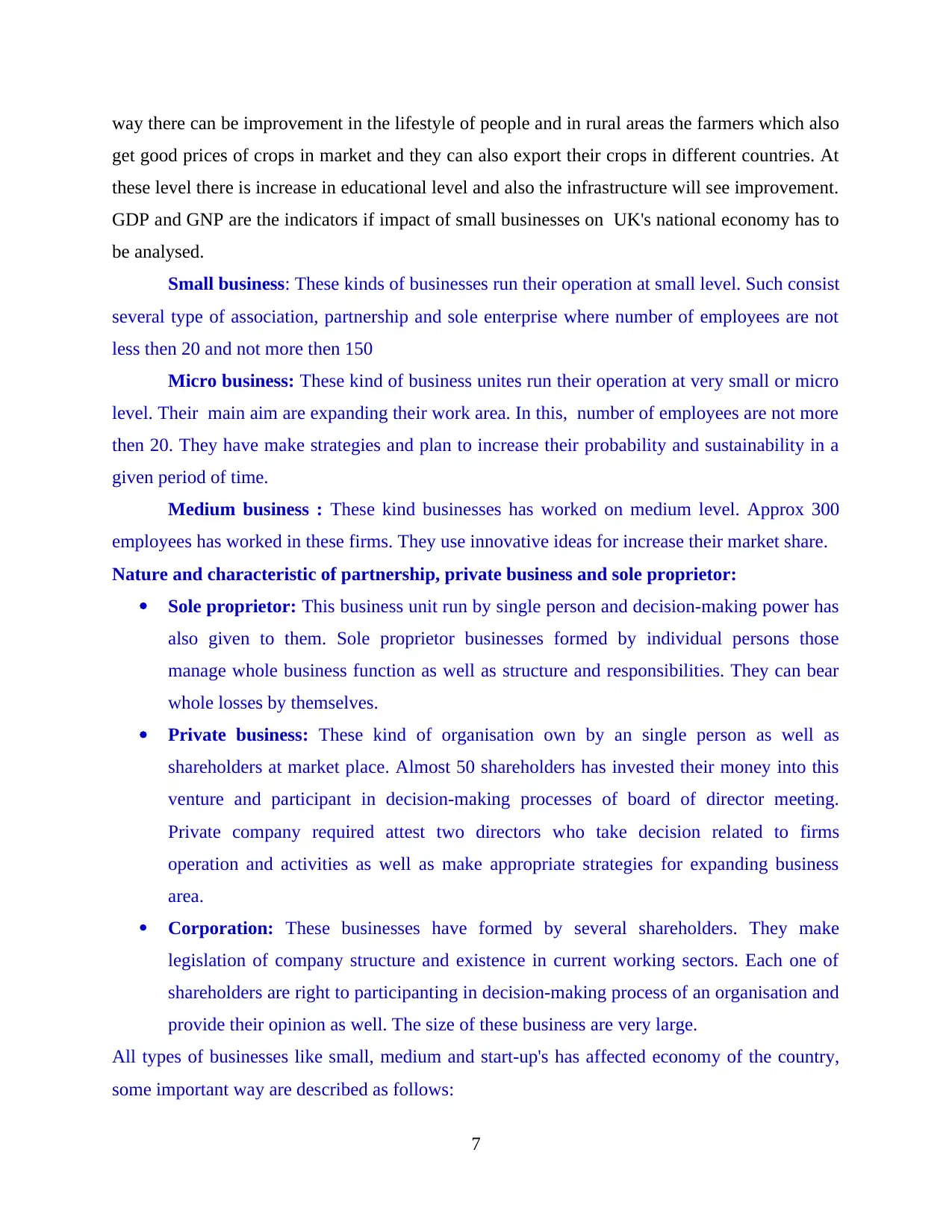
way there can be improvement in the lifestyle of people and in rural areas the farmers which also
get good prices of crops in market and they can also export their crops in different countries. At
these level there is increase in educational level and also the infrastructure will see improvement.
GDP and GNP are the indicators if impact of small businesses on UK's national economy has to
be analysed.
Small business: These kinds of businesses run their operation at small level. Such consist
several type of association, partnership and sole enterprise where number of employees are not
less then 20 and not more then 150
Micro business: These kind of business unites run their operation at very small or micro
level. Their main aim are expanding their work area. In this, number of employees are not more
then 20. They have make strategies and plan to increase their probability and sustainability in a
given period of time.
Medium business : These kind businesses has worked on medium level. Approx 300
employees has worked in these firms. They use innovative ideas for increase their market share.
Nature and characteristic of partnership, private business and sole proprietor:
Sole proprietor: This business unit run by single person and decision-making power has
also given to them. Sole proprietor businesses formed by individual persons those
manage whole business function as well as structure and responsibilities. They can bear
whole losses by themselves.
Private business: These kind of organisation own by an single person as well as
shareholders at market place. Almost 50 shareholders has invested their money into this
venture and participant in decision-making processes of board of director meeting.
Private company required attest two directors who take decision related to firms
operation and activities as well as make appropriate strategies for expanding business
area.
Corporation: These businesses have formed by several shareholders. They make
legislation of company structure and existence in current working sectors. Each one of
shareholders are right to participanting in decision-making process of an organisation and
provide their opinion as well. The size of these business are very large.
All types of businesses like small, medium and start-up's has affected economy of the country,
some important way are described as follows:
7
get good prices of crops in market and they can also export their crops in different countries. At
these level there is increase in educational level and also the infrastructure will see improvement.
GDP and GNP are the indicators if impact of small businesses on UK's national economy has to
be analysed.
Small business: These kinds of businesses run their operation at small level. Such consist
several type of association, partnership and sole enterprise where number of employees are not
less then 20 and not more then 150
Micro business: These kind of business unites run their operation at very small or micro
level. Their main aim are expanding their work area. In this, number of employees are not more
then 20. They have make strategies and plan to increase their probability and sustainability in a
given period of time.
Medium business : These kind businesses has worked on medium level. Approx 300
employees has worked in these firms. They use innovative ideas for increase their market share.
Nature and characteristic of partnership, private business and sole proprietor:
Sole proprietor: This business unit run by single person and decision-making power has
also given to them. Sole proprietor businesses formed by individual persons those
manage whole business function as well as structure and responsibilities. They can bear
whole losses by themselves.
Private business: These kind of organisation own by an single person as well as
shareholders at market place. Almost 50 shareholders has invested their money into this
venture and participant in decision-making processes of board of director meeting.
Private company required attest two directors who take decision related to firms
operation and activities as well as make appropriate strategies for expanding business
area.
Corporation: These businesses have formed by several shareholders. They make
legislation of company structure and existence in current working sectors. Each one of
shareholders are right to participanting in decision-making process of an organisation and
provide their opinion as well. The size of these business are very large.
All types of businesses like small, medium and start-up's has affected economy of the country,
some important way are described as follows:
7
Paraphrase This Document
Need a fresh take? Get an instant paraphrase of this document with our AI Paraphraser
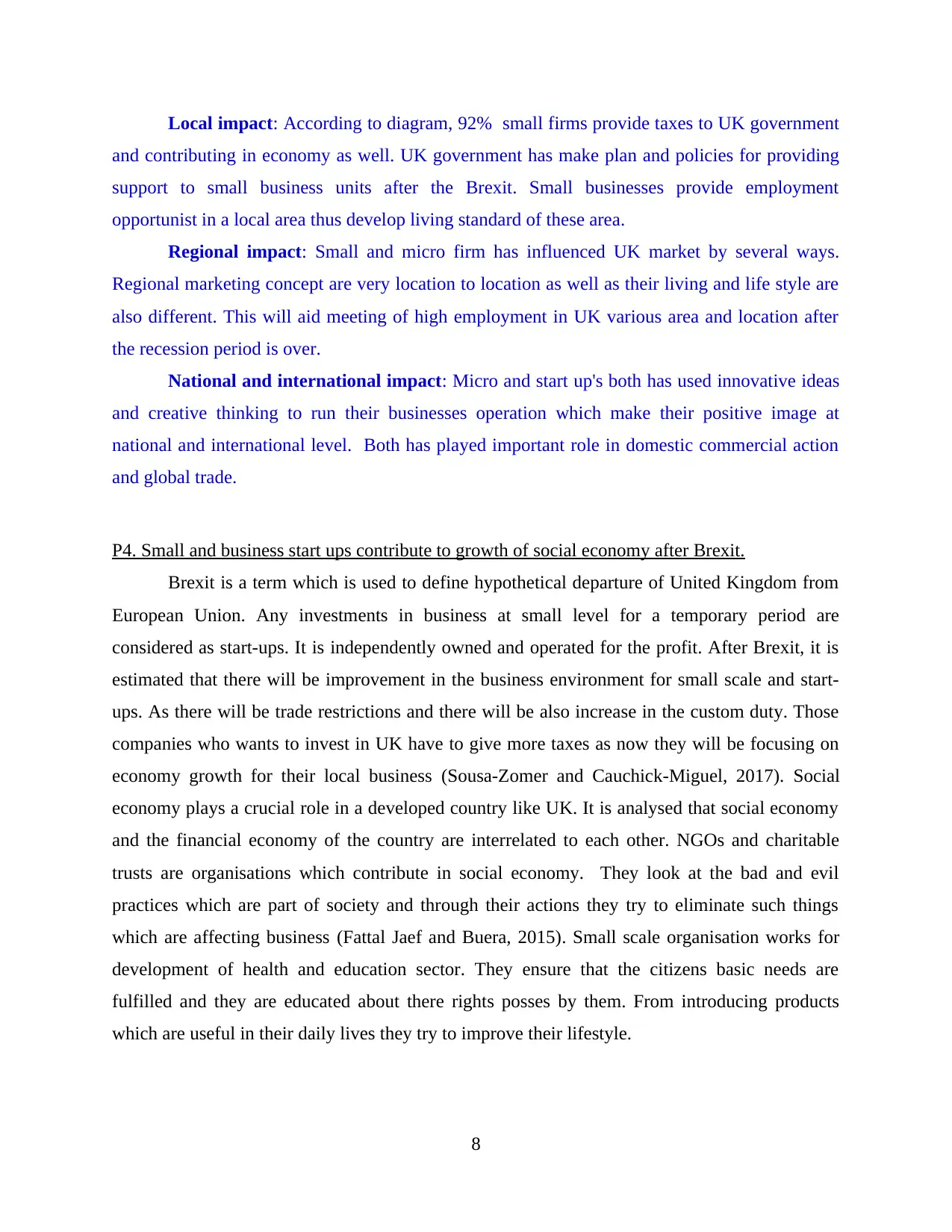
Local impact: According to diagram, 92% small firms provide taxes to UK government
and contributing in economy as well. UK government has make plan and policies for providing
support to small business units after the Brexit. Small businesses provide employment
opportunist in a local area thus develop living standard of these area.
Regional impact: Small and micro firm has influenced UK market by several ways.
Regional marketing concept are very location to location as well as their living and life style are
also different. This will aid meeting of high employment in UK various area and location after
the recession period is over.
National and international impact: Micro and start up's both has used innovative ideas
and creative thinking to run their businesses operation which make their positive image at
national and international level. Both has played important role in domestic commercial action
and global trade.
P4. Small and business start ups contribute to growth of social economy after Brexit.
Brexit is a term which is used to define hypothetical departure of United Kingdom from
European Union. Any investments in business at small level for a temporary period are
considered as start-ups. It is independently owned and operated for the profit. After Brexit, it is
estimated that there will be improvement in the business environment for small scale and start-
ups. As there will be trade restrictions and there will be also increase in the custom duty. Those
companies who wants to invest in UK have to give more taxes as now they will be focusing on
economy growth for their local business (Sousa-Zomer and Cauchick-Miguel, 2017). Social
economy plays a crucial role in a developed country like UK. It is analysed that social economy
and the financial economy of the country are interrelated to each other. NGOs and charitable
trusts are organisations which contribute in social economy. They look at the bad and evil
practices which are part of society and through their actions they try to eliminate such things
which are affecting business (Fattal Jaef and Buera, 2015). Small scale organisation works for
development of health and education sector. They ensure that the citizens basic needs are
fulfilled and they are educated about there rights posses by them. From introducing products
which are useful in their daily lives they try to improve their lifestyle.
8
and contributing in economy as well. UK government has make plan and policies for providing
support to small business units after the Brexit. Small businesses provide employment
opportunist in a local area thus develop living standard of these area.
Regional impact: Small and micro firm has influenced UK market by several ways.
Regional marketing concept are very location to location as well as their living and life style are
also different. This will aid meeting of high employment in UK various area and location after
the recession period is over.
National and international impact: Micro and start up's both has used innovative ideas
and creative thinking to run their businesses operation which make their positive image at
national and international level. Both has played important role in domestic commercial action
and global trade.
P4. Small and business start ups contribute to growth of social economy after Brexit.
Brexit is a term which is used to define hypothetical departure of United Kingdom from
European Union. Any investments in business at small level for a temporary period are
considered as start-ups. It is independently owned and operated for the profit. After Brexit, it is
estimated that there will be improvement in the business environment for small scale and start-
ups. As there will be trade restrictions and there will be also increase in the custom duty. Those
companies who wants to invest in UK have to give more taxes as now they will be focusing on
economy growth for their local business (Sousa-Zomer and Cauchick-Miguel, 2017). Social
economy plays a crucial role in a developed country like UK. It is analysed that social economy
and the financial economy of the country are interrelated to each other. NGOs and charitable
trusts are organisations which contribute in social economy. They look at the bad and evil
practices which are part of society and through their actions they try to eliminate such things
which are affecting business (Fattal Jaef and Buera, 2015). Small scale organisation works for
development of health and education sector. They ensure that the citizens basic needs are
fulfilled and they are educated about there rights posses by them. From introducing products
which are useful in their daily lives they try to improve their lifestyle.
8
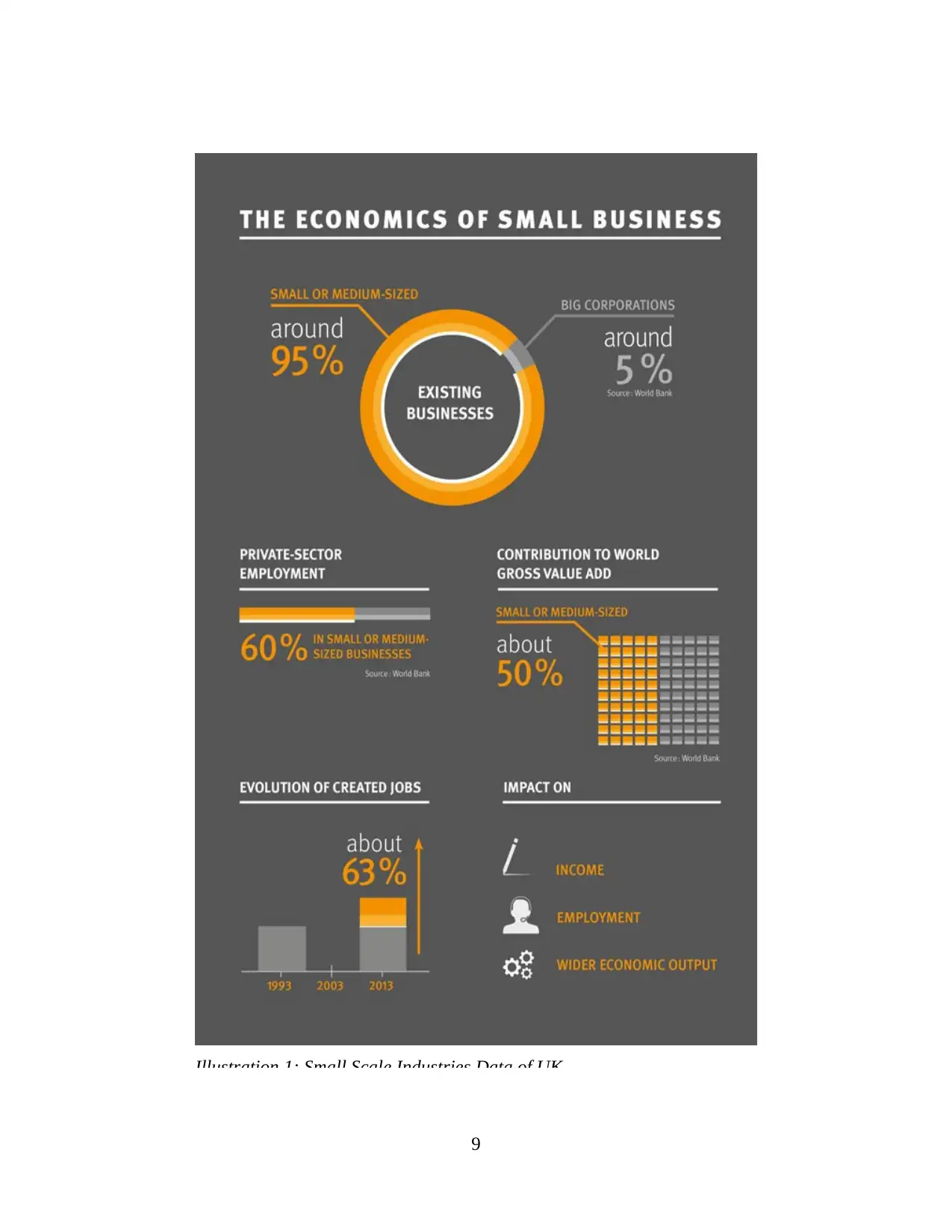
9
Illustration 1: Small Scale Industries Data of UK
Illustration 1: Small Scale Industries Data of UK
⊘ This is a preview!⊘
Do you want full access?
Subscribe today to unlock all pages.

Trusted by 1+ million students worldwide
1 out of 20
Related Documents
Your All-in-One AI-Powered Toolkit for Academic Success.
+13062052269
info@desklib.com
Available 24*7 on WhatsApp / Email
![[object Object]](/_next/static/media/star-bottom.7253800d.svg)
Unlock your academic potential
Copyright © 2020–2026 A2Z Services. All Rights Reserved. Developed and managed by ZUCOL.





